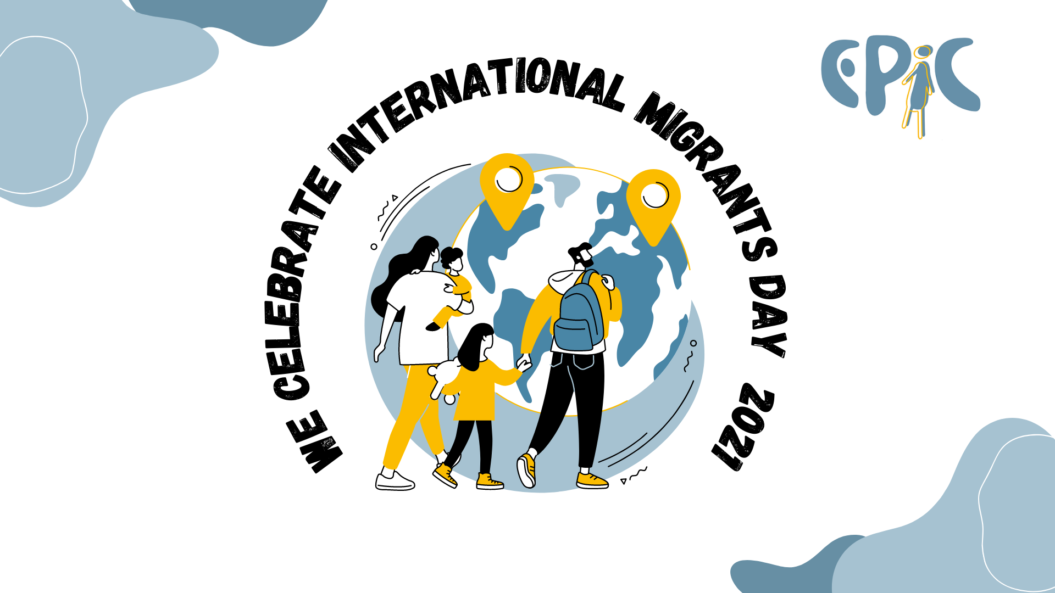
International Migrants Day – 18th 2021
On the occasion of International Migrants Day on December 18, 2021, the partners of the EPIC project wish to join other initiatives such as those launched by the United Nations or the Intercultural Cities Program of the Council of Europe to celebrate the day and raise awareness about the different realities, overcoming stories, but also inequalities and difficulties experienced by millions of migrants around the world.
We know migration is a natural ancient phenomenon shaped by many factors. Last year over 280 million people were living outside their country of origin1. Therefore, when we speak about migration, we are talking about millions of different faces, stories and realities. Whether seeking refuge after fleeing the war, moving for financial or family reasons, or to study abroad, each migrant has their own personal story along the journey.
However, we see how very often, especially in times of economic downturn, some politicians and societal figures frame and communicate about migration as a single situation of crisis that gives a sense of problem, urgency or danger. These messages dehumanize migrants, use them as scapegoats for other deep-rooted societal issues and jeopardise social cohesion by generating ‘the fear of the Other’ and making it more challenging for newcomers to generate a sense of belonging in their new country.
On the International Migrants Day we want to acknowledge that migration and migrants have shaped our societies in many different positive ways, such as bringing innovation from their countries of origin, addressing market and skills gaps and overcoming demographic downturns. But also, that whatever the reasons to move and leave behind the country of origin, families or friends are, integration is a long term process that requires both newcomers and the native-born citizens to make an effort to understand and respect each other.
What can we do to normalize migration debates and encourage welcoming societies?
- The fear of the Other’ or the fear of the Unknown, divide people and build invisible walls. But very often when people have the chance to meet, one realised there is more that we have in common than what divides us. Do not be afraid to interact and get to know people from other cultures, this will increase your level of understanding. Avoid judging without knowing and do not impose stereotypes.
- Give visibility to initiatives empowering individuals of different backgrounds, raising awareness about their needs and stories
- Like in social media, use their hashtags, share their content with your network and comment or speak about them.
- If you are organising an event, make sure to reach out to a diverse audience and that speakers offer diverse points of views and represent different groups and communities.
- If you have a platform (website, social media pages or groups, newsletter, blog, etc.) for your organisation, you may want to invite migrants in your territory to share their experiences, by writing an article, doing an interview or recording a short video that will help to give them visibility, empower their voices and raise awareness about diversity in your community.
- Reject hate speech and learn how to avoid falling into the fake news trap. EPIC has organised two informative webinars on how to understand and tackle hate speech, and how to design communication campaigns for a more nuanced public opinion on migration. Fact-checking tools and guidelines to analyse messages online, such Reporterslab, a database of global fact-checking sites, can help you.
- Write a letter expressing your support to refugees to your Mayor, European Parliament Member, local Council, to the editor of your local newspaper, or other politician or community leader. Here you have an example www.europewelcomes.org/draft-letter.php
- Check what support campaigns are going on in your city and what else you can do (donations, food, clothes or medicines drive, fundraising, offering accommodation, volunteering for festivals, events or as a tutor/mentor in accompanying initiatives or language exchange, etc.)
- A few pages that offer information an examples on how to engage or stories to share are:
- https://www.iom.int/migrantsday
- https://www.refugees-welcome.net
- https://www.ittakesacommunity.org/
- https://wearesinga.com/
- https://www.europewelcomes.org/#
- https://www.airbnb.org/get-involved?locale=en
- https://www.refugee-action.org.uk/heres-can-help-refugees/
- https://iamamigrant.org/
- https://www.europemustact.org/
- http://migrationmatters.me/
1United Nations Department of Economic and Social Affairs, Population Division (2020). International Migration 2020 Highlights (ST/ESA/SER.A/452). https://www.un.org/development/desa/pd/sites/www.un.org.development.desa.pd/files/international_migration_2020_highlights_ten_key_messages.pdf